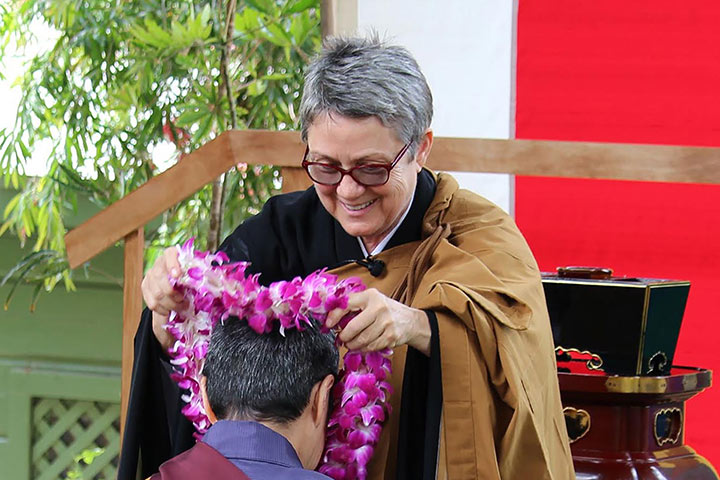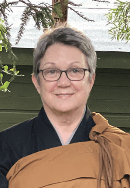
Gratitude and Change in the Year of the Tiger
January 1, 2022

by Deb Kyobai Faith-Mind Thoresen
Please join me as we collectively welcome in the New Year, 2022, the year of the Tiger!
Personally, I am grateful to be putting 2021 behind and though living in the moment, I am also excited about the possibilities that will unfold in 2022. What are you wanting to leave behind? What are you looking forward to? What is the moment for you?
What better image could there be for entering the new year than a Tiger? They are courageous, brave, charming, and endowed with good luck and authority. These attributes will be very foundational for this coming year as the Zen Center transitions the leadership into the Three Seats of Abbot (I’ll continue), Head Teacher (Sensei Katherine Senshin Griffith) and Head Priest/Preceptor (Rev. Tom Dharma-Joy Reichert). Preceptor Lorraine Gessho Kumpf has also taken on the new position of Senior Resident, and will work with the resident community on training, with an emphasis on the Sangha Sutra, nurturing a sense of interrelationship and collective practice.
Roshi Egyoku will continue teaching as Senior Dharma Teacher, offering face-to-face and guidance to students. Our gratitude to her for her many years of teaching, visioning and leading is immeasurable. As she shared in her letter to the Sangha, though she may be moving, she is not retiring. We are very grateful to her for her continued teaching, mentoring and commitment to the Zen Center.
Our theme for the Fall Practice Period was Gratitude. Often, we’re told to remember to be grateful for blessings or good fortune, but Buddhism teaches us to be grateful, period. Gratitude is to be cultivated as a habit or attitude of mind not dependent on conditions. Roshi Egyoku called this “Radical Gratitude,” absolute and utter Gratitude! I ask myself, what happened to all the gratitude I have felt in the past? Where did it go? Do I believe that gratitude is dependent on feeling good right now?
How do I cultivate gratitude? When we do zazen, as Dogen Zenji tells us, we are not examining ourselves or trying to make personal improvements. We are sitting within Buddha’s heart, releasing ourselves to that aspect of ourselves that deeply belongs to the universe and is grateful for it. When we bow and make offerings and chant sutras and dedicate them, we are expressing our gratitude that there is something and not nothing.
As Wendell Berry’s poem so beautifully states in a chapter on Gratitude in The Burning House:
The Peace of Wild Things:
When despair for the world grows in me
and I wake in the night at the least sound
in fear of what my life and my children’s lives may be, I go and lie down where the wood drake
rests in his beauty on the water, and the great heron feeds. I come into the peace of wild things
who do not tax their lives with forethought
of grief. I come into the presence of still water.
And I feel above me the day-blind stars
waiting with their light. For a time
I rest in the grace of the world and am free.
May you find your place of rest and feel free to live this very life – Now!
Sensei Faith-Mind is the Abbot of ZCLA.
